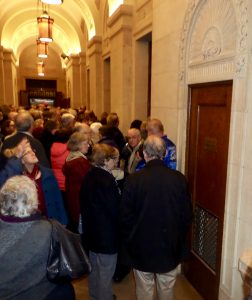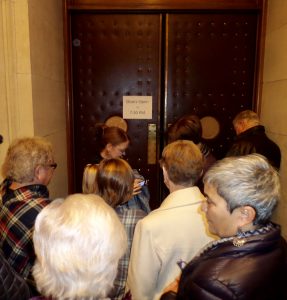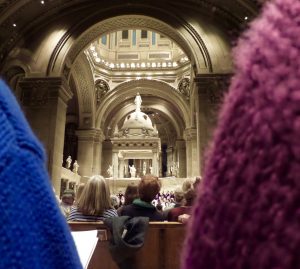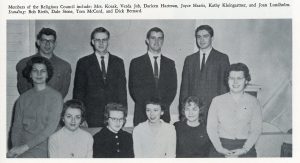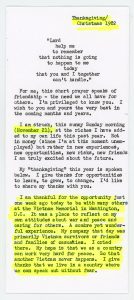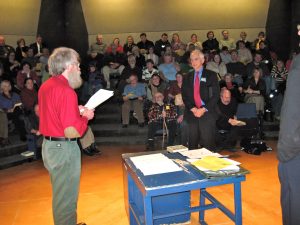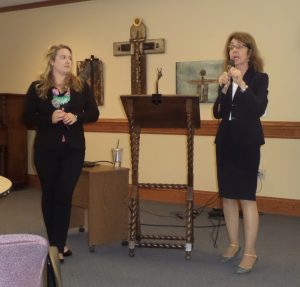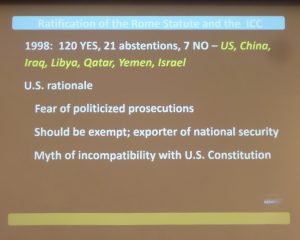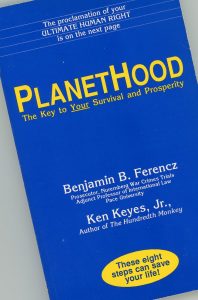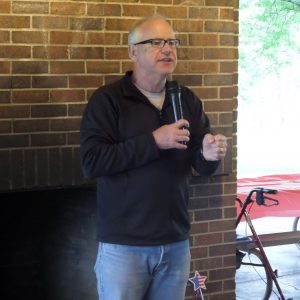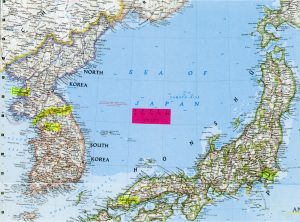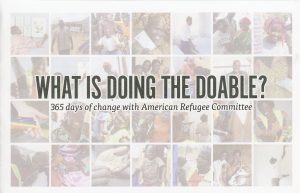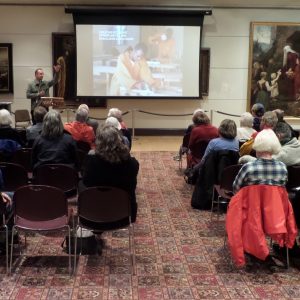POSTNOTE Monday June 26: Saturday morning I first saw the three word message on the public blackboard at my coffee place. Six hours later was an added message, also shown below. This morning someone else had written a few words in defense of taxes. Overnight came Just Above Sunset about the disastrous consequences of getting rid of Obamacare. Get involved. Speak out.
(click to enlarge)
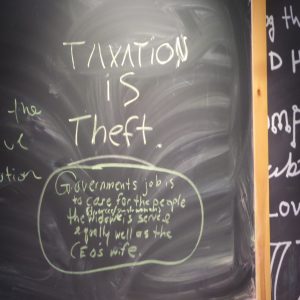
Public messages at coffee, June 24, 2017
*
PRENOTE to readers: I found an additional photo of Whitestone Hill which I have inserted in the May 31 post (here); Also, there have been a couple of contrasting and passionate opinions expressed on Castile-Yanez, which you can read here. Additional comments are solicited.
POSTNOTE June 23: If you have time this weekend, read this column.
If you do Facebook, see Barack Obama’s Official Facebook page for his position on the issue.
*
Today’s newspaper had a bland headline about the Senate Republicans summary Health Care proposal. This is the secret document that hardly anyone, including Republican Senators, have even seen; for which there have been no hearings, which will be called up for a vote with possibly no debate at all, before the July 4 recess.
It is being rushed through, my opinion, mostly to make a “win” for somebody (the Republican “base”, Trump…); but more important to open the door for huge tax cuts for the very rich. The biggest victims will likely be what might be called Trump’s core constituency, people who won’t be able to bob and weave within the new system, whatever it turns out to be.
There is an easy comparison:
In 2009 and 2010, after over 40 public hearings and endless opportunities for open debate everywhere, the Affordable Care Act (quickly and derisively dubbed “Obamacare”) was enacted. Immediately there were endless repetitions in the House of Representatives to “repeal Obamacare”.
The Affordable Care Act was never perfect. Anything negotiated has problems. (Anything NOT negotiated is far, far worse.)
Consider a system which is, they say, one-sixth of the total American economy…you “don’t turn” such a system “on a dime” – a whim.
In addition, however, to the theater of ritual repeal in the Congress, every means available was and has continued to be used to assure failure of the Affordable Care Act at federal and state level.
Obamacare just refused to die, and we, the people, actually found that it was working well, which has simply intensified the process to kill it and replace it with something much worse, with the savings to go towards tax cuts for the already excessively wealthy.
*
The contrast in process in 2009-10 and today could not be more stark. Even the most cursory review of the available literature about the long terms goals of “repeal and replace” with something new are frightening. But few seem to care. We will learn who the beneficiaries are.
There is an interesting thread of brief comments at the end of this post. Note what “A” and “B” have to say. They are people just like you and me.
*
The victims of this and other political games will be today’s young people. And that’s where the “committing suicide” comes in.
Theoretically, the U.S. is a participatory democracy with free and fair elections, open to all, plenty of debate beforehand.
The ascendance of greed as a primary virtue, and the accompanying lack of interest in being well informed or even participate politically, are ultimately our ruin, unless we step in, as individuals, in all the ways we can. “There is no free lunch”, my elders used to say. Too many of us have become adept at gaming the very system on which we ultimately depend.
An example of the quandary: A couple of days ago a friend sent a column by David Leonhardt in the June 20 New York Times.
My friends intro to the column was three words: “If liberals voted.”
Leonhardts first paragraph, in part, said this: “…an extremely short political quiz: What percentage of American citizens between the ages of 18-24 voted in the last Congressional midterm elections in 2014?”
I followed the rules and guessed 40%. Make your own guess before checking the answer.
You have to read the first few paragraphs of the most interesting (and depressing) column for the answer to Leonhardt’s question, with more information as well.
*
The Republicans ultra right wing is close to fulfilling their fondest dream, “killing” Obama (and all he represents, including liberals like myself).
The traditional way we tend to deal with bad news is to blame someone else for it, and to shift responsibility from ourselves to someone – anyone – else. I can hear the litany already…but the ball is in each and every one of our own “courts”. We are the solution, or we are the problem.
In a dictatorship we might have more of an argument for avoiding being in action. But we’re still in a basically free society…which without our action, is killing itself. The most vulnerable among us, including those who are too young to vote, will in the long run be the first to pay the price.
The wealthy will pay too – it will just take a little longer.
As for the rich, how many yachts do they need? And what good will their tax cut do for them, or for anyone else?
Everybody has a part to play.
Play it.
*
More on the same general issue, here. I always recommend this long and six days a week resource on national politics. The price is right: it’s free, delivered after midnight.
*
Here is a conversation starter: some comments from routine e-mail traffic between two friends, yesterday and today (I am neither A nor B):
A. “It’s been (and continues to be pretty) very difficult to be [part of] a health insurance carrier that’s chosen to stay in the exchanges. It’s risky and lots of strategic discussions, contingencies, and last minute changes have made for frustration and long hours.”
B. “Wish everyone would realize that insurance is for the unexpected, get coverage for that possibility, and be covered if/when it happens. We [all of us] are so tuned to having something for little or nothing that we forget that someone will pay when we don’t. Sorry it hits your industry so hard. Personally, I’m glad I’ve reached the “golden years” and only have to stay as healthy as I can, happy when I don’t have to use the insurance that you and yours now subsidize. Thank you!”
A. “Very wise words! People do not get it. The corollary is that if you think that everyone doesn’t deserve and therefore won’t have health insurance, think again. We all pay for one another’s health care costs whether we have insurance or not. From my perspective, why not do it right. Not sure that we know what right is yet but pretty sure we’re not heading that way.”
B. “Every day I’m grateful that we were able to help [our son] stay ensured, even when he was between jobs, as a young man. When his disease process became critical, at age 35, it was love and good fortune that he was married and insured under [his wife’s] family plan. Still, if he had lived, they would have faced a life-time limit on medical care and drug costs. Single payer health care for all is the only way I see out of this terrible dilemma of escalating health care costs.
The ACA was only workable if everyone had to pay in and even that didn’t work. Health care costs are exorbitant here in the US, likely because we demand luxury treatment for everything, but don’t expect to pay for it. Helping people to stay healthy and understand there are choices to be made in anticipation of end of life should be givens in health care.”
A. “The ACA was only workable if everyone had to pay in and even that didn’t work.
Partly it didn’t work because it wasn’t really enforced and the consequences of paying were low. Our chief Actuary, who is not an ACA proponent said that if you want people to buy a plan, price the penalty at the same rate as the cheapest ACA compliant plan in the market. It’s a good idea.
There were (are) loopholes that you could drive a truck through and people used them. They’d also do things like buy a cheaper bronze plan, have a child and switch to the richest plan when the child was born (allowed under the ACA) and have the birth paid as if they’d been paying premium for the more expensive plan all year. People would not buy plans then get sick and find a way to get a special enrollment period that allowed them to buy a plan to cover their often pricey treatment. I could go on about the reasons that it didn’t work well but I think that there were absolutely ways to tweak and improve.
The gamesmanship was unbelievable.”


